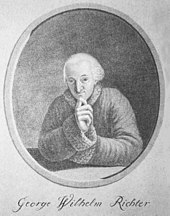George Wilhelm Richter

George Wilhelm Richter (* 1735 in Leipzig ; † August 1800 there ) was a German wine merchant , cafetier and Freemason .
Life
George Wilhelm Richter was a prosperous Leipzig wine merchant. In 1770 he acquired the Romanushaus , on the second floor of which he opened a café in 1772. In six to seven rooms there was card games , music, journals , billiards , wine and suppers . Due to its location and furnishings, the Richter'sche Café became the leading and most expensive of the eight coffee houses in Leipzig. It became a meeting point for Leipzig society and attracted numerous visitors such as Friedrich Schiller , who repeatedly visited the café and mentioned it in his letters. Schiller reported about the cold Royal Punch served at the trade fair by Richter's . Every year Richter had a song written and printed about it. After it sang, the punch season began.
In 1792 the first social association of the German book trade met in Richter's house, a forerunner of the stock exchange association of German booksellers . In 1794 the judge, who had probably got into economic difficulties, sold the Romanushaus to the French merchant Jacob Marcus Anton Dufour. George Wilhelm Richter died in Leipzig in August 1800.
George Wilhelm Richter was initially a member of the Leipzig Freemason Lodge Minerva to the three palms and joined the newly founded Lodge Balduin zur Linde in 1776 with matriculation number 8 . In 1776 and 1781 he held the office of master of ceremonies there.
literature
- Michael Müller: The Romanushaus in Leipzig. Leipzig 1990, pp. 61-72.
Web links
Individual evidence
- ↑ Carol Banon: From Salon to Kaffekranz. In: Bach's Changing World: Voices in the Community. University Rochester Press, 2006, p. 211.
- ↑ August Diezmann: Sketches from the past and present. Lorck, Leipzig 1856.
- ^ Journal for Factory, Manufactory and Action. Volume 73, Voss and Leo, 1800, p. 326.
- ^ The Freemauerloge Balduin zur Linde in Leipzig, 1776–1876: Festschrift for the secular celebration on May 27 and 28, 1876. Naumann, 1876, pp. 1 and 150.
| personal data | |
|---|---|
| SURNAME | Judge, George Wilhelm |
| ALTERNATIVE NAMES | Judge, Georg Wilhelm |
| BRIEF DESCRIPTION | German cafetier and freemason |
| DATE OF BIRTH | 1735 |
| PLACE OF BIRTH | Leipzig |
| DATE OF DEATH | August 1800 |
| Place of death | Leipzig |
